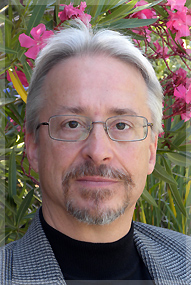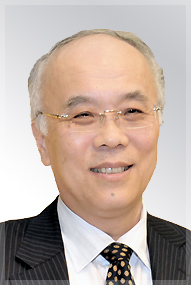The 2011 Keio Medical Science Prize Awardees
Philip A. Beachy, Ph.D.

Investigator, Howard Hughes Medical Institute
Ernest and Amelia Gallo Professor, Stanford University School of Medicine
Department of Biochemistry and Institute for Stem Cell Biology and Regenerative Medicine
Reason for Selection
Identification of Hedgehog, a key molecule in development, and its medical applications
Our bodies develop from single fertilized eggs in an organized manner. The molecular mechanisms of development processes have fascinated scientists for decades. Dr. Philip A. Beachy and his colleagues identified the hedgehog gene and reported that it plays pivotal roles in many developmental processes in Drosophila and mammals. Hedgehog is a signaling molecule that is secreted and becomes distributed in developing tissues, inducing various cell fates. Importantly, they reported that Hedgehog must be modified by cholesterol for its proper functioning. This discovery opened a new era in developmental biology. Currently, they are investigating the roles of Hedgehog signaling in cancer cell proliferation and have found that cyclopamine, a plant-derived alkaloid, is a specific inhibitor of the Hedgehog pathway. Based on this finding, cyclopamine and its derivatives are being investigated as anticancer drugs against medulloblastoma and basal cell carcinoma, which are caused by excessive Hedgehog signaling.
Background
<Education and Training>
- 1975-1979
- B.A., Goshen College, Goshen, IN, Natural Sciences
- 1979-1980
- Non-Degree Student in Chemistry, Indiana University, South Bend, IN
- 1980-1981
- Graduate Student, Department of Genetics, Stanford University, Stanford, CA
- 1981-1986
- Ph.D., "Molecular biology of homeotic gene function in Drosophila" (with David Hogness), Department of Biochemistry, Stanford University, Stanford, CA.
- <Positions>
-Carnegie Institution of Washington-
- 1986-1988
- Staff Associate, Department of Embryology
-Johns Hopkins University School of Medicine-
- 1988-1993
- Assistant Professor, Department of Molecular Biology and Genetics
- 1993-1998
- Associate Professor, Department of Molecular Biology and Genetics
- 1998-2006
- Professor, Department of Molecular Biology and Genetics
- 2004-2006
- Professor, Department of Oncology
Stanford University School of Medicine
- 2006-present
- Professor, Institute of Stem Cell Biology and Regenerative medicine, and Department of Developmental Biology
- 2007-present
- Ernest and Amelia Gallo Professor in the School of Medicine
- 2011-present
- Professor, Department of Biochemistry
- -HHMI-
- 1988-1996
- Assistant Investigator, Johns Hopkins University School of Medicine
- 1996-2000
- Associate Investigator, Johns Hopkins University School of Medicin
- 2000年2006
- Investigator, Stanford University School of Medicine
- 2006-present
- Associate Investigator, Johns Hopkins University School of Medicin
<Major Honors and Awards>
- 1997
- Outstanding Young Scientist Award, Maryland Academy of Sciences
- 1998
- National Academy of Sciences Award in Molecular Biology
- 2002
- Member, National Academy of Sciences
- 2003
- Fellow, American Academy of Arts and Sciences
- 2008
- March of Dimes Prize in Developmental Biology, shared with Cliff Tabin
Keiji Tanaka, Ph.D.

Director General
Tokyo Metropolitan Institute of Medical Science
Reason for Selection
Discovery of proteasome and elucidation of its physiological functions
Proteins are essential components of organisms, and their synthesis and degradation is controlled synergistically by mRNA within cells. The proteasome, a large protein complex responsible for the selective degradation of intracellular proteins, was first discovered by Dr. Keiji Tanaka. Since then, Dr. Tanaka has focused on elucidating the structure and molecular/physiological functions of the proteasome for the past 30 years. The discoveries of immunoproteasomes, which are important for distinguishing self and non-self , and of thymoproteasomes, which are important for the differentiation of T cells in the thymus, are some highlights of his work. His current research interests include intracellular proteolysis mediated by the proteasome, ubiquitin, as well as the autophagy system in eukaryotes in general. His great achievements have revealed that these intracellular proteolytic systems are involved in the development of many diseases.
Background
<Education and Training>
- 1972
- Graduated from School of Nutrition, Faculty of Medicine, The University of Tokushima
- 1976
- Dropout from Doctoral Program in Medical Sciences, The University of Tokushima
- 1980
- Ph.D.
- <Positions>
- 1976
- Assistant Professor, Institute for Enzyme Research, The University of Tokushima
- 1980
- Ph.D.
- 1981
- Postdoctoral fellow , Harvard Medical School, USA (2 years)
- 1995
- Associate Professor, Institute for Enzyme Research, The University of Tokushima
- 1996
- Head of Department of Molecular Oncology, The Tokyo Metropolitan Institute of Medical Science
- 2002
- Vice-Director, The Tokyo Metropolitan Institute of Medical Science
- 2006
- Acting-Director, The Tokyo Metropolitan Institute of Medical Science
- 2011- present
- Director General, Tokyo Metropolitan Institute of Medical Science
- Visiting professor
(Present) - The University of Tokyo, Niigata University, Tokyo Medical and Dental University, Ochanomizu University, University of Tsukuba
<Major Honors and Awards>
- 2003
- The Naito Foundation Merit Award for Advancement of Science
- 2004
- Uehara Award
- 2004
- The Asahi Prize
- 2008
- The Takeda Medical Prize
- 2010
- Japan Academy Prize
